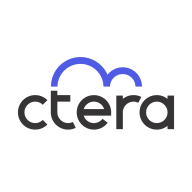

CTERA Enterprise File Services Platform and NetApp Cloud Volumes Service for Google Cloud are competing in the enterprise file services domain. CTERA stands out due to its pricing and support, while NetApp's cloud integration gives it an edge in long-term ROI.
Features: CTERA Enterprise File Services Platform offers distributed caching, data protection, and seamless collaboration suitable for global enterprises. It provides strong file federation and security. NetApp Cloud Volumes Service provides high-performance storage, advanced data management, and analytics capabilities, with a strong emphasis on Google Cloud integration.
Ease of Deployment and Customer Service: CTERA offers flexible deployment options for cloud and on-premise environments, supporting hybrid models. It provides extensive customer service for complex infrastructures. NetApp Cloud Volumes Service simplifies deployment using Google Cloud's infrastructure for scalable solutions and benefits from Google's robust support ecosystem.
Pricing and ROI: CTERA is recognized for competitive setup costs and quick ROI, appealing to companies seeking scalable, cost-effective file services. NetApp's pricing reflects its premium Google Cloud integration, which some may find justified by its enhanced cloud functionalities. CTERA provides immediate ROI through its pricing model, while NetApp offers potential long-term ROI via seamless cloud integration and advanced features.
| Product | Market Share (%) |
|---|---|
| CTERA Enterprise File Services Platform | 4.2% |
| NetApp Cloud Volumes Service for Google Cloud | 1.3% |
| Other | 94.5% |

| Company Size | Count |
|---|---|
| Small Business | 2 |
| Midsize Enterprise | 2 |
| Large Enterprise | 8 |
The CTERA Enterprise File Services Platform provides a cloud-native global file system over public and private object storage, revolutionizing the world of hybrid cloud data solutions. Enhanced by a rich data services ecosystem, CTERA enables enterprises to gain full control of their data for optimal edge performance, data insight, and governance. The platform focuses on security, providing features like data encryption, access controls, and ransomware protection. Centralized management tools enable efficient data control and monitoring. The platform is being used to replace legacy NAS and file servers, especially at remote locations, and simplify backup and disaster recovery of file data while providing the flexibility of multi-cloud deployments with infinite scalability. CTERA is at the core of hybrid cloud transformations of some of the world’s largest banks, healthcare organizations, global media groups, and government agencies, in deployments that scale to tens of petabytes.
NetApp® Cloud Volumes for Google Cloud is a fully managed or self-managed file service that is integrated into Google Cloud with the multiprotocol support, performance, and availability required to run business-critical applications. It is designed to provide massively parallel shared access to thousands of Google Compute Engine and Google Kubernetes Engine instances, enabling your applications to achieve high levels of aggregate throughput and IOPS with consistent low latencies.
Use cases. Customers can use the service to migrate existing enterprise applications to Google Cloud. Other use cases include hybrid deployments, multicloud mobility, big data analytics, web serving and content management, application development and testing, media and entertainment workflows, database backups, container storage, and more.
Features. Multiple performance tiers, standard file interfaces, advanced data management, metered service, fully managed service, native service experience, integrated support, and integrated billing.
For more information:
NetApp: https://cloud.netapp.com/cloud-volumes-service-for-gcp
Google: https://cloud.google.com/netapp
We monitor all Cloud Migration reviews to prevent fraudulent reviews and keep review quality high. We do not post reviews by company employees or direct competitors. We validate each review for authenticity via cross-reference with LinkedIn, and personal follow-up with the reviewer when necessary.